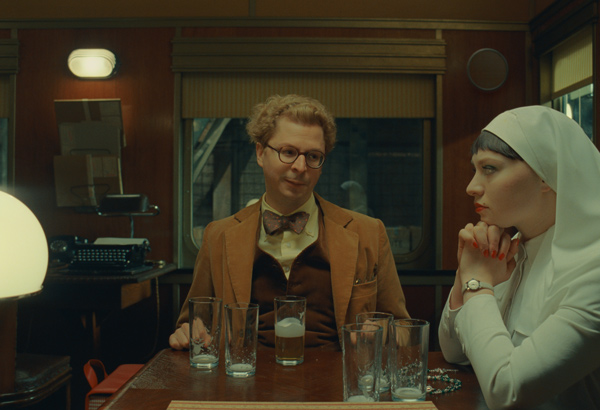Much Ado About Fussing: Anderson Spills More Twee
 The Wes Anderson devotee cult has been searching for a way to justify his cinematic sainthood following an arguable trend of hollow triumphs, and it seems his latest endeavor, The Phoenician Scheme, will likely be heralded as a jubilant return to form. If that form is recycling a more concise narrative centered around an egotistical eccentric with classist tendencies peddling through a bizarre reunion with estranged offspring, then, yes, perhaps this is the case. However, Anderson’s latest is undoubtedly another empty spectacle of hyper articulated dialogue and scattershot humor requiring unadulterated allegiance to either the director or his starry ensemble to truly appreciate. Those embittered, cynical enthusiasts who once upon a time approached Anderson as an auteur with a sense of cinematic awe will have to revisit their own nostalgic memories of his early work for there is absolutely nothing meaningful in film which results in yet another pass around his kitschy merry-go-round.
The Wes Anderson devotee cult has been searching for a way to justify his cinematic sainthood following an arguable trend of hollow triumphs, and it seems his latest endeavor, The Phoenician Scheme, will likely be heralded as a jubilant return to form. If that form is recycling a more concise narrative centered around an egotistical eccentric with classist tendencies peddling through a bizarre reunion with estranged offspring, then, yes, perhaps this is the case. However, Anderson’s latest is undoubtedly another empty spectacle of hyper articulated dialogue and scattershot humor requiring unadulterated allegiance to either the director or his starry ensemble to truly appreciate. Those embittered, cynical enthusiasts who once upon a time approached Anderson as an auteur with a sense of cinematic awe will have to revisit their own nostalgic memories of his early work for there is absolutely nothing meaningful in film which results in yet another pass around his kitschy merry-go-round.
Zsa Zsa Korda (Benicio Del Toro) is an eccentric European tycoon who has amassed a coterie of powerful enemies, so much so he has just survived his sixth assassination attempt while crash-landing a compromised plane. The lucky industrialist decides he must plan for the future, for who knows how long his luck to survive such attempts will last, and so he decides to entrust his empire to Liesl (Mia Threapleton), his only daughter and a novitiate nun who has no relationship with her father, so to speak.
In addition to Liesl, he has nine sons, several of whom are adopted and none destined to be his heir. Oh, and Liesl thinks Zsa Zsa murdered her mother, though there’s a possibility his half-brother Nabor (Benedict Cumberbatch, donning a Boudu Saved From Drowning beard) was the responsible party. The US government has designs to sabotage Korda’s lofty plan titled the ‘Korda Land and Sea Phoenician Infrastructure Scheme’ which aims to mine an underutilized but perpetually war torn region for a vast, Ayn Rand-ish ambitious multipurpose venture (which also recalls murdered Italian industrialist Enrico Mattei). With his nun-child in tow, he must visit all the wealthy donors to collect a percentage of their promised advance against the interim shortfall which occurred due to the US government’s meddling, forcing the price of necessary goods required by the ‘scheme’ to skyrocket. But Zsa Zsa has been ‘fiddling’ with the previously signed contracts and so we get an endless assault of Anderson regulars during these various pit stops, including a second cousin (Scarlet Johansson), who he intends to marry. Zsa Zsa also experiences visions of death, wherein he must defend his life at the pearly gates where Bill Murray as God and a series of other notable actors are on cameo duty.

In the almost three decades worth of Wes Anderson’s specific cinematic universe, witnessing the unveiling of a new feature has come to feel like some arthouse version of The Emperor’s New Clothes. Plenty of renowned auteurs have been accused of remaking the same film over and over again, such as Hong Sangsoo, for instance. But Sangsoo often has an underlying motive and intention with fluctuations of tone and scope. The Phoenician Scheme is more of the overly manicured, archly affected roundelay of circumstance we’ve come to expect, and those prone to fancying dizzying, nonsensical dialogue with stiff punch lines and flat call backs can feast once more on Anderson’s endless buffet of blandness. There’s essentially nothing wrong with mind numbing drugs, but for those who have developed a tolerance for Anderson, his latest is merely a remix of his past daddy issue films. But by now, he’s a director of almost unparalleled esteem, so there’s no one like a Gene Hackman who’s now going to challenge his approach. A cast of Anderson alumni and nepo newbies have become his twirling puppets doling out the same exact sentiments and desperately trying to convince us it’s something new.
 If we’re meant to align aspects of Zsa Zsa Korda with Donald Trump or Elon Musk, based on his asinine entrepreneurial skills or his sprawling brood of estranged children, respectively, these comparisons are about as significant as a character name which recalls Zsa Zsa Gabor and Alexander Korda. By now, this set-up feels beyond frustrating in its familiarity as Anderson sets up his encrypted journey through a rigid roadmap of kooky characters and an additional heavenly aside to boot. All these stops on Korda’s tour to collect the capital from his investors are really a fussy distraction from the main thrust of a father supposedly trying to reconnect with his estranged daughter (who might actually be his niece for an extra set of complications). Del Toro is giving his mightiest attempt to convey the world weary nonchalance demanded of him, but there’s nothing essentially captivating or resonant about Zsa Zsa Korda (especially if comparing him to Ralph Fiennes in The Grand Budapest Hotel, Bill Murray in The Life Aquatic with Steve Zissou, or Gene Hackman in The Royal Tenenbaums). While Alexandre Desplat tries to fool us into a sense of foreboding with another distracting score for Anderson, the most egregious assault is Kate Winslet’s daughter Mia Threapleton, the pipe smoking novitiate nun lassoed into her father’s scheming. Her attempts at deadpan humor fall flat and for those who exist outside of the film’s specifically tuned wavelength, it’s unclear what the appeal is supposed to be beyond the performer’s novelistic pedigree.
If we’re meant to align aspects of Zsa Zsa Korda with Donald Trump or Elon Musk, based on his asinine entrepreneurial skills or his sprawling brood of estranged children, respectively, these comparisons are about as significant as a character name which recalls Zsa Zsa Gabor and Alexander Korda. By now, this set-up feels beyond frustrating in its familiarity as Anderson sets up his encrypted journey through a rigid roadmap of kooky characters and an additional heavenly aside to boot. All these stops on Korda’s tour to collect the capital from his investors are really a fussy distraction from the main thrust of a father supposedly trying to reconnect with his estranged daughter (who might actually be his niece for an extra set of complications). Del Toro is giving his mightiest attempt to convey the world weary nonchalance demanded of him, but there’s nothing essentially captivating or resonant about Zsa Zsa Korda (especially if comparing him to Ralph Fiennes in The Grand Budapest Hotel, Bill Murray in The Life Aquatic with Steve Zissou, or Gene Hackman in The Royal Tenenbaums). While Alexandre Desplat tries to fool us into a sense of foreboding with another distracting score for Anderson, the most egregious assault is Kate Winslet’s daughter Mia Threapleton, the pipe smoking novitiate nun lassoed into her father’s scheming. Her attempts at deadpan humor fall flat and for those who exist outside of the film’s specifically tuned wavelength, it’s unclear what the appeal is supposed to be beyond the performer’s novelistic pedigree.
There’s certainly a vibrant, welcoming audience salivating for Anderson’s brand (namely, it would seem, the French, who also had a special yen for Jerry Lewis). Whatever The Phoenician Scheme seems to be offering, congratulations to those who are enlightened or enlivened through the consumption of its contrived excess. For those numb to its charms, it’s nothing short of trying.
Reviewed on May 18th at the 2025 Cannes Film Festival (78th edition) – Competition. 105 Mins.
★/☆☆☆☆☆


